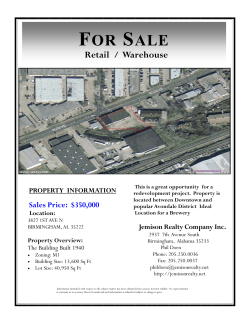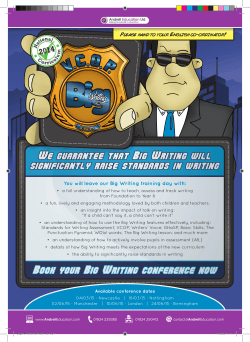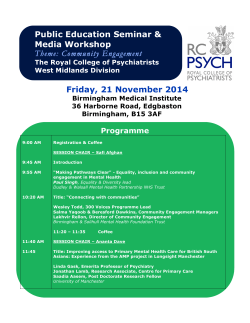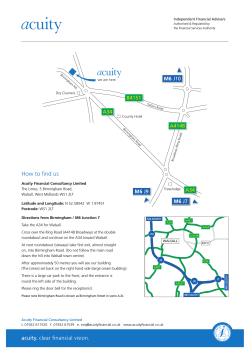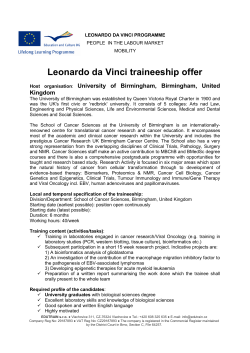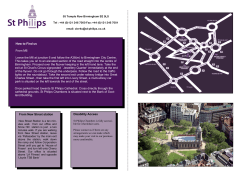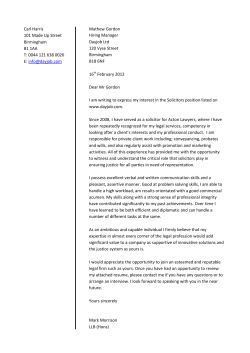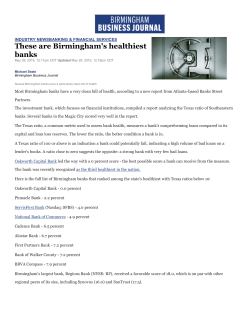
Birmingham, Alabama Entrepreneurial District
TEAM SNAPSHOT Birmingham, Alabama PAULA ALVAREZ-PINO PROJECT SNAPSHOT Entrepreneurial District CENTER COORDINATOR & RESEARCH ASSISTANT, SUSTAINABLE SMART CITIES RESEARCH CENTER, UNIVERSITY OF ALABAMA AT BIRMINGHAM Sustainability will be the central organizing principle of the Entrepreneurial District plan. The EcoDistricts Framework model will be utilized to engage a diverse group of public, private and non-profit stakeholders with the objective to identity quantitative and qualitative opportunities and benefits, clearly define the project’s sustainability vision, goals, and process, develop an action agenda, and explore how emerging tools can add value to project implementation. Paula coordinates and communicates work effort and development within the Center. Paula collaborates with the City of Birmingham as liaison in several projects related to the field of sustainability, such as the IBM Smarter Cities Challenge, the Mobile Food Market, and Birmingham Bikeshare. Paula has also helped organize and develop outreach programs that educate the youth about the principles of sustainability. She received a bachelor of science in Civil, Construction and Environmental Engineering from UAB and is a credentialed practitioner on Envision Sustainable Infrastructure rating system. She is pursuing her masters in the field of Civil Engineering. TIMOTHY GAMBREL ZONING ADMINISTRATOR, CITY OF BIRMINGHAM Tim Gambrel is the Zoning Administrator for the City of Birmingham. He leads a team of planners responsible for current planning reviewing public and private development projects for compliance with the City’s Zoning Ordinance and Subdivision Regulations. Tim holds a Bachelors of Science degree from Jacksonville State University. He is also the coowner of The Cheese Advocate, a local gourmet food distributor. CHRIS HATCHER team lead URBAN DESIGN ADMINISTRATOR, CITY OF BIRMINGHAM As the Urban Design Administrator for Birmingham, Chris leads a team responsible for preparing and reviewing public and private development projects, economic feasibility and program implementation, and supporting the city’s revitalization strategies through urban design, historic preservation, architectural, and planning activities. He holds a BA from Auburn University, a Master of Urban and Regional Planning from Alabama A&M University, and is a member of the American Institute of Certified Planners. He is a member of Trinity Baptist Church, where he serves on the Deacon’s Board, and several other Birmingham non-profits. He is also the co-owner of Hatcher’s Florist. BRUCE HERRINGTON PRESIDENT/FOUNDING, HERRINGTON ARCHITECTS As President and founder of Herrington Architects, Bruce works closely with project managers to ensure its clients receive creative, thoughtful, and thorough design solutions. He also coordinates strategic marketing and monitors its financial activities. He holds a Bachelor of Architecture degree from Mississippi State University and has over 30 years of architectural design and professional experience. Herrington regularly volunteers his time with the Birmingham Chapter of the American Institute of Architects and with the Birmingham Architectural Foundation. He is a member of Briarwood Presbyterian Church where he currently serves as a deacon and a member of the Buildings & Grounds Committee. NATALIE KELLY PRESIDENT, SUSTAIN As the founder and CEO of Sustain, an environmental strategy and media agency, Kelly couples her passion for the environment, social responsibility, and innovation with her expertise in marketing and management. Previously, Kelly founded MyGreenBirmingham.com, an on-line resource that connected Birmingham locals to the emerging green movement. She was also Marketing and Business Development Manager at Kelly Road Builders. Kelly serves on several boards including the Birmingham Botanical Gardens and the Auburn University Diversity Leadership Council. She is a Commissioner for Red Mountain Park, the city’s largest public green space. Kelly holds a BA in English from Auburn University. ROBERT PETERS PROFESSOR, ENVIRONMENTAL ENGINEERING, UNIVERSITY OF ALABAMA AT BIRMINGHAM Dr. Robert Peters’ current research focuses on storm water mitigation and quality associated with green roofs; building energy and roofing conservation; condensate recovery involving air handling units; sustainable design and rating systems; and municipal sustainability plans. Previously, he served as Research Area Leader of the Environmental Technologies group in Argonne National Laboratory’s Energy System Division. He was technical manager of a number of large projects dealing with remediation of contaminated soil and groundwater. He received his B.S.Ch.E. from Northwestern University and his M.S. and Ph.D. in chemical engineering from Iowa State University. BEN WIESEMEN leed ap DIRECTOR OF CATALYTIC DEVELOPMENT, REV BIRMINGHAM Ben is the Director of Catalytic Development for REV Birmingham, which works through real estate development or public space improvements to create environments where the market can thrive. Wieseman is responsible for undertaking redevelopment projects owned and managed by REV and in partnerships with others; manages REV’s real estate portfolio; and facilitates improvements in the public realm. Ben holds a master’s degree in Real Estate Development from Auburn University and is trained and licensed as a landscape architect in the state of Alabama. He is a certified planner with the American Planning Association and LEED AP. 12 2015 ECODISTRICTS INCUBATOR Once called “The Pittsburgh of the South,” Birmingham’s economy was based on iron and steel production. The collapse of these industries in the 1970s and 1980s resulted in disinvestment and decline in the commercial districts and neighborhoods that had grown around these employment and activities centers, including the city’s original Railroad Reservation, located in the center of Birmingham’s street grid. After decades of inactivity and decline, sub-areas of the Railroad Reservation are experiencing a rebirth stemming from targeted public and private investment. The Entrepreneurial District, located in the northwest section of the Railroad Reservation, was established in 2003 by the City of Birmingham to encourage the development of a concentration of technology-related communities in the downtown core. There were a considerable number of vacant lots and empty buildings available at affordable prices in this area, and stakeholders developed a vision of a mixed-use district including research and office buildings, housing and retail. top 3 1. 2. 3. Why this Neighborhood? The vision for the Entrepreneurial District is a sustainable, resilient and vibrant mixed use neighborhood center around research, innovation and technology. With the opening of Railroad Park, Regions Field, increasing success of the Innovation Depot, and growing number of technology and other knowledge industry businesses downtown, the Entrepreneurial District is ripe for a district plan. The most significant opportunities are the Innovation Depot and proximity to the UAB Medical Center and Campus. The Innovation Depot is a 140,000 square foot technology center and business incubation program located in the heart of the district. It focuses on developing emerging biotechnology/life science, information technology, engineering, and service businesses and operates in partnership with the University of Alabama at Birmingham (UAB). The proximity of the UAB Medical Center and campus is a major advantage for the Entrepreneurial District. The area is also the location of a $30 million transit hub that will serve Amtrak passenger rail as well as Greyhound and Megabus intercity buses, the Birmingham-Jefferson County Transit Authority’s (BJCTA) MAX buses, and a dedicated shuttle to BirminghamShuttlesworth International Airport. Several historic buildings are also being redeveloped into mixed-use units. Hotel to a 96-unit mixed-use development. Developing a district framework and implementation strategies that is based on data informed decisions and flexible in their application Encouraging development of both public and privately funded high-impact projects in the district Establishing a policy agenda with laws, incentives, and processes to sustainable development practices in neighborhoods and districts across the city top 3 1. 2. 3. Neighborhood priorities: Neighborhood challenges: Mitigating environmental contamination of former industrial sites Educating area developers and businesses on the social and economic benefits of green infrastructure and green building practices The perceived negative perception of crime and safety in the area 2015 ECODISTRICTS INCUBATOR 13
© Copyright 2025
